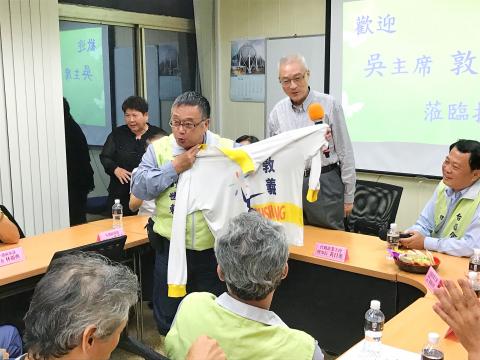The Chinese Nationalist Party (KMT) yesterday canceled its weekly Central Standing Committee (CSC) meeting reportedly due to a new wave of intraparty fighting between outgoing KMT Chairwoman Hung Hsiu-chu (洪秀柱) and chairman-elect Wu Den-yih (吳敦義) over the right to nominate Central Committee members.
According to the party’s agenda, Central Committee members are to be nominated by Hung on June 14, with the election of party representatives and Central Standing Committee members to be held on July 7 and July 29 respectively.
This means that Wu, who is scheduled to assume the chairmanship on Aug. 20, when the party’s national congress is also to be held, will not be able to nominate candidates for the elections.

Photo: Hung Chen-hung, Taipei Times
Sources said Wu was planning to raise the issue during the committee meeting yesterday in a bid to secure nominating rights.
Hung responded by canceling the meeting.
A source from Hung’s faction yesterday accused Wu of attempting to “wipe out” her camp.
The alleged infighting occurred despite a written pledge by the six candidates for the chairperson election last month to promote party and to rebuild the pan-blue camp.
A source from KMT headquarters yesterday presented minutes taken during past Central Standing Committee meetings showing that the upcoming elections have been organized in the same manner as the previous two elections, in which the party chief nominated the candidates.
In response to remarks by more than 20 CSC members that the election rules breached the KMT’s charter and that they would take the issue to a court, the source said that could be a solution, but it would damage the party’s public image.
However, considering that a majority of the CSC members oppose Hung, it is unlikely that the her camp would be able to stop changes to the election rules during the committee’s meeting on Wednesday next week, the source said.
KMT Legislator Lee Yen-hsiu (李彥秀) said that Hung’s postponement of yesterday’s meeting because she was afraid of losing her nomination rights has made the party a joke.
Comparing the issue to “domestic affairs,” she said that it could be resolved by facilitating communication.
KMT Legislator Johnny Chiang (江啟臣) said that many items in the run-up to the chairperson handover needed coordination and that procedural issues should be addressed.
The party should demonstrate unity so that its would not be compromised by its adversaries in a period of challenges, he said.
Meanwhile, Wu has been faced with the first conundrum since his election — making up for a NT$10 million (US$332,204) shortage in this month’s salary payments to party employees.
Additional reporting by Shih Hsio-kuang

MAKING WAVES: China’s maritime militia could become a nontraditional threat in war, clogging up shipping lanes to prevent US or Japanese intervention, a report said About 1,900 Chinese ships flying flags of convenience and fishing vessels that participated in China’s military exercises around Taiwan last month and in January last year have been listed for monitoring, Coast Guard Administration (CGA) Deputy Director-General Hsieh Ching-chin (謝慶欽) said yesterday. Following amendments to the Commercial Port Act (商港法) and the Law of Ships (船舶法) last month, the CGA can designate possible berthing areas or deny ports of call for vessels suspected of loitering around areas where undersea cables can be accessed, Oceans Affairs Council Minister Kuan Bi-ling (管碧玲) said. The list of suspected ships, originally 300, had risen to about

DAREDEVIL: Honnold said it had always been a dream of his to climb Taipei 101, while a Netflix producer said the skyscraper was ‘a real icon of this country’ US climber Alex Honnold yesterday took on Taiwan’s tallest building, becoming the first person to scale Taipei 101 without a rope, harness or safety net. Hundreds of spectators gathered at the base of the 101-story skyscraper to watch Honnold, 40, embark on his daredevil feat, which was also broadcast live on Netflix. Dressed in a red T-shirt and yellow custom-made climbing shoes, Honnold swiftly moved up the southeast face of the glass and steel building. At one point, he stepped onto a platform midway up to wave down at fans and onlookers who were taking photos. People watching from inside

Japan’s strategic alliance with the US would collapse if Tokyo were to turn away from a conflict in Taiwan, Japanese Prime Minister Sanae Takaichi said yesterday, but distanced herself from previous comments that suggested a possible military response in such an event. Takaichi expressed her latest views on a nationally broadcast TV program late on Monday, where an opposition party leader criticized her for igniting tensions with China with the earlier remarks. Ties between Japan and China have sunk to the worst level in years after Takaichi said in November that a hypothetical Chinese attack on Taiwan could bring about a Japanese

STREAMLINED: The dedicated funding would allow the US to transfer equipment to Taiwan when needed and order upgraded replacements for stockpiles, a source said The US House of Representatives on Thursday passed a defense appropriations bill totaling US$838.7 billion, of which US$1 billion is to be allocated to reinforcing security cooperation with Taiwan and US$150 million to replace defense articles provided to the nation. These are part of the Consolidated Appropriation Act, which the US House yesterday passed with 341 votes in favor and 88 against. The act must be passed by the US Senate before Friday next week to avoid another government shutdown. The US House Committee on Appropriations on Monday unveiled the act, saying that it allocates US$1 billion for the Taiwan Security Cooperation Initiative